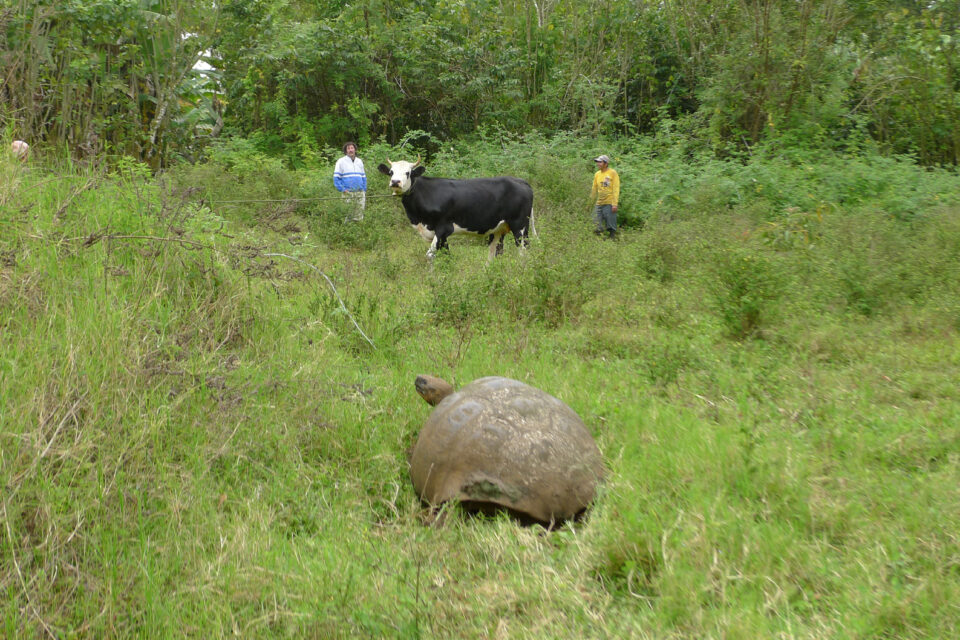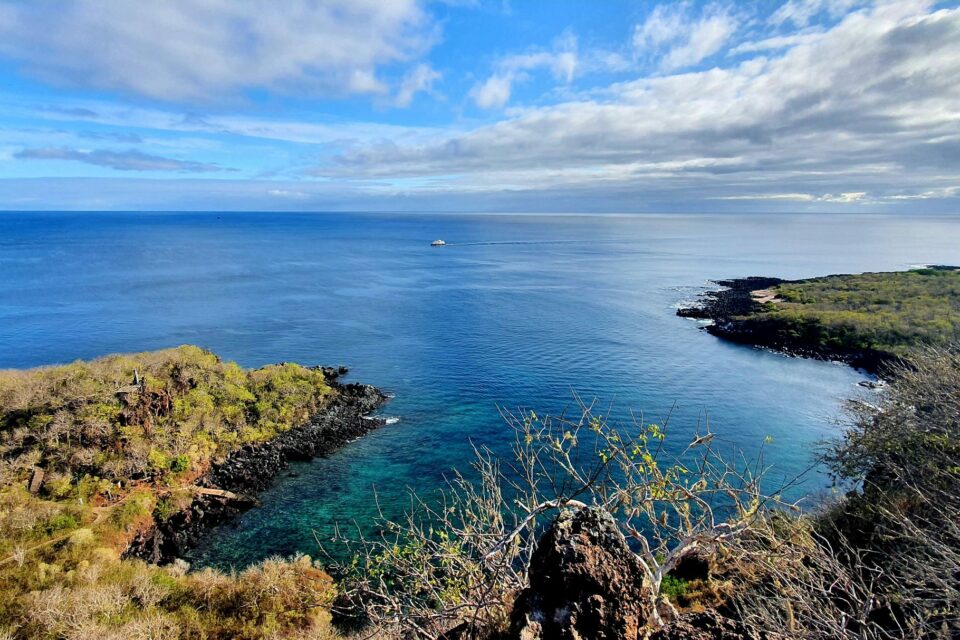

Galapagos, lockdown and the impacts of COVID-19 – Interview Series Part 1 – Dr Ainoa Nieto
An interview with Dr Ainoa Nieto, Wildlife Veterinarian and Researcher at the Charles Darwin Foundation, and researcher for the Galapagos Tortoise Movement Ecology Programme.
Life under lockdown is one of those rare experiences the world has gone through together. People’s lived experiences, are however, often very different across geographic locations. We thought it would be interesting to see how Galapagos and its residents have found life under lockdown and get their opinions on how the post-COVID world will influence the Islands and their incredible wildlife.
This blog is part one of an interview series with some of Galapagos Conservation Trust’s (GCT) staff, project partners, friends and ambassadors based in or working on the Islands to see how their life has changed under lockdown and how their work will be impacted in the future.
Our first interviewee is Dr Ainoa Nieto, Wildlife Veterinarian and Researcher at the Charles Darwin Foundation, and researcher for the Galapagos Tortoise Movement Ecology Programme.
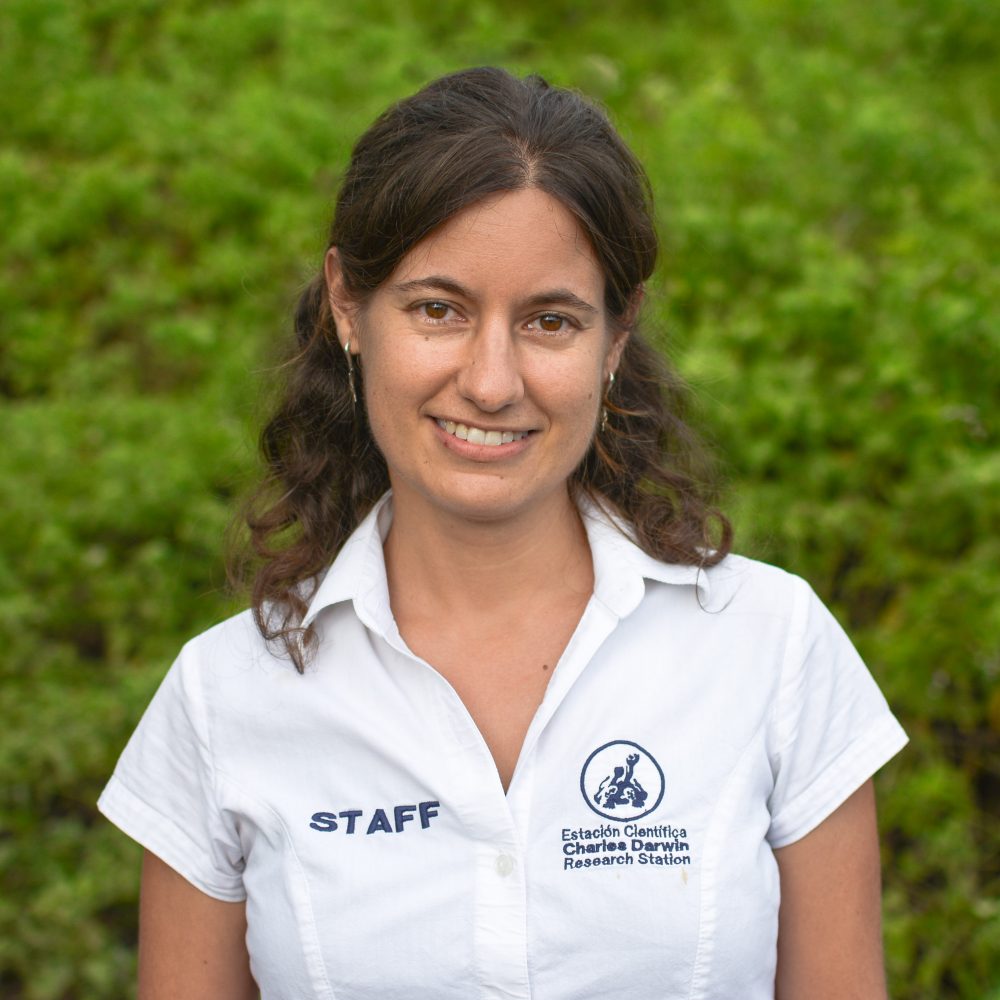
1. How has the pandemic affected your day-to-day life on the Islands?
As in many other places around the world, no movement was allowed, so we had to stay home. We had to stop all field and laboratory work and remained home for weeks. In the beginning, the situation was very uncertain, and I had to adapt to work from home. Flight connectivity from Galapagos to mainland Ecuador and abroad stopped, as well as transportation between islands. Personally, and with most of my relatives in Spain, I did suffer from stress and fear for my family during the first few weeks. I had to ask my volunteers to leave the Islands for safety reasons, and reorganised and rescheduled most activities. Many friends and colleagues had to leave, and we could not even say goodbye.
We had a curfew from 14:00 to 5:00 every day, which was also very stressful. I was lucky enough to continue working from home, focusing on analysing data and writing papers and proposals. Communication during quarantine was also challenging, and I had to find new ways to communicate with co-workers, friends and family. Fortunately, we were able to find food and groceries thanks to local initiatives and entrepreneurs that organised themselves to supply the local community. Our diet changed since we were not able to find the same variety of food, but also improved as we eat more local and organic food.
Several cases of misuse and corruption are being investigated across the country, and the violence against women and children also increased dramatically during the quarantine with a woman killed by her partner here in Puerto Ayora just a few weeks ago. Social and ecological consequences of this pandemic go far beyond movement restrictions, with many implications for wider society.
2. What lockdown protocols are currently in place, and how have they been enforced/communicated?
Now we are slowly coming out of quarantine, so curfew is from 21.00 until 5.00. We are currently allowed to go back to fieldwork slowly and I am also working at the laboratory on outstanding work. This week (June 18) is the first since March 16 that I was able to work in the field. Local authorities created WhatsApp groups to receive up-to-date information, but sometimes regulations changed very quickly, which was confusing at times.
3. With no tourists on the Islands, what has been the immediate impact on yourself and locals?
The tourism industry suddenly stopped. For most local people, their main income disappeared, and every day the impacts of this situation are more obvious. In my personal experience, my husband had to close the guest house he runs and has not received any income or support since the quarantine started. I have seen many local people moving to the highlands and start growing food at their farms, as did we. In Ecuador and Galapagos, many people live on low incomes and without the tourism industry to support people, there is the potential for an economic crisis with unknown consequences.
4. As we come out of lockdown, how do you think things will need to change as you go forward for conservation/education work and life on the Islands in general?
In my opinion, the current pandemic is a wake-up call for all humans around the world. We cannot continue as we were, and the main lesson from this situation should be that our actions have consequences. We need to rethink our way of living, consuming and interacting with nature and other species. We need to regroup and design strategic plans to ensure food sovereignty, sustainable development, waste management, conservation of ecosystems and species, land-use organisation, etc. The pressure that we – humans – are putting on environments and wildlife is disrupting the ecological balance in so many ways that we must make big and deep changes to prevent the next pandemic. Our health reflects the health of the planet, the health of plants, animals and environments. If we do not take care of the place where we live, there would be no future for us.
5. What conservation activities have you been able to continue and what has been placed on hold?
Over the last three months, no field conservation activities were conducted in Galapagos. We could not conduct any education/outreach activities either. However, this break allowed us to regroup and reconsider some of our priorities and methodologies. I had time to focus on data and analyses. It was a very valuable time to re-evaluate our work and improve some methods for future activities. I was also able to dedicate a lot more time to my PhD studies and to read and write about the work that we have done over the last few years. I also put a lot of effort to communicate our work on social media as a way of also sharing good and positive news.
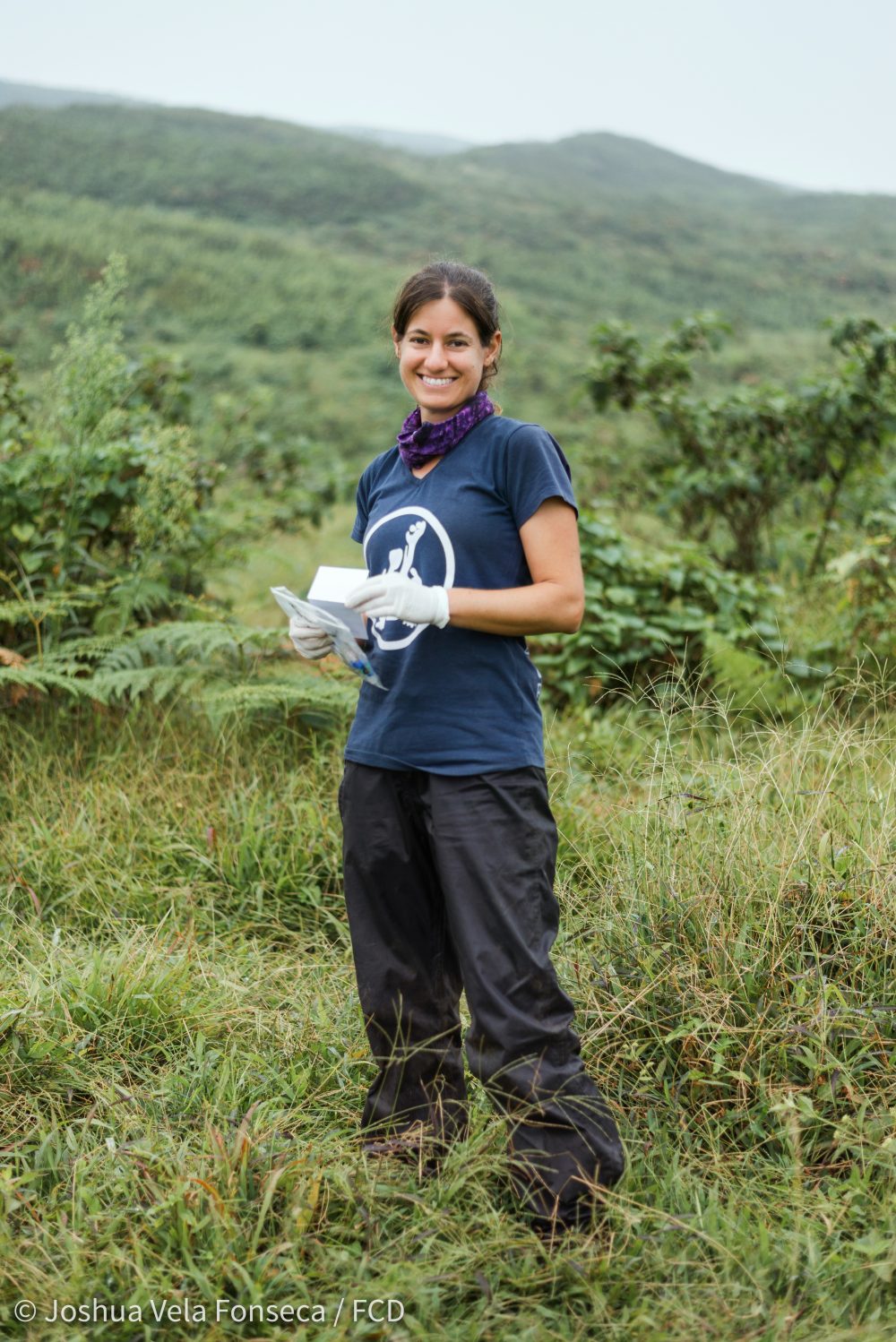
Dr Ainoa Nieto out in the field prior to the enforced lockdown during the height of the COVID-19 outbreak © Joshua Vela Foncesca/FCD
6. What are your main concerns in the short and long-term for the wildlife of Galapagos (either to species you directly work with or other vulnerable species)?
My main concern for Galapagos – and for global – wildlife is uncontrolled development. I am afraid that the pandemic will be used to support management decisions that will go against conservation. We need to control the number of tourists that can come to Galapagos every year, ensure sustainable development in all four inhabited islands, support local and small business, reinforce politics and regulations to control wildlife trafficking and overfishing, etc. Politics and local authorities always said in Galapagos that we could not stop the tourism industry. Now Covid-19 did it for us. The lockdown gave us the perfect scenario to start over and do things better. We need to learn from our experiences and create new rules to ensure social and ecological sustainability for Galapagos. An uncontrolled and profit-based “back to normal” will put too much pressure on the ecosystems and the already endangered and unique species of the Galapagos Archipelago. We should not kill the goose that lays the golden eggs.
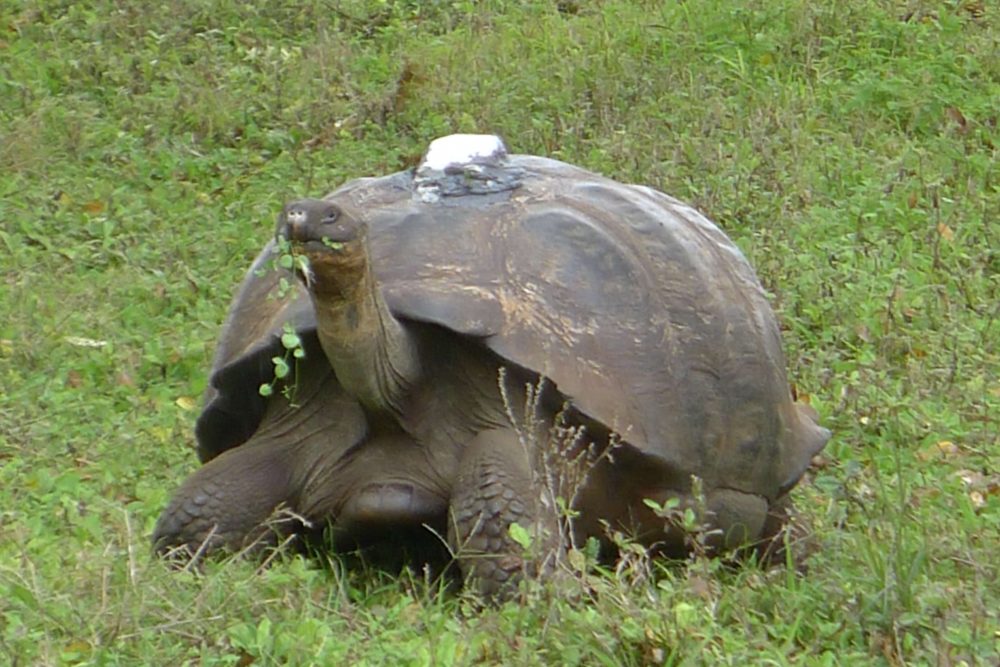
Dr Nieto is concerned that about the loss of data, with three months worth of monitoring giant tortoises lost during lockdown © GTMEP
8. What are the activities you will prioritise when the lockdown protocols are eased?
For the short and mid-term, our main priority is to secure funding for our staff and the conservation work we do in Galapagos. Fieldwork is also one of our main priorities within the Programme as we have lost three months of data already. Our tagged tortoises are not being monitored over the lockdown period and relocating them now might be challenging. We are also going to conduct a research project within farms visited by tourists to assess how constant tourism may influence tortoise behaviour and produce stress. The team is also developing some education and outreach activities for local students that could take place either online or on-site. We need to complete laboratory analyses in Galapagos and Spain, and I am hoping to travel there later this year to attend a conference and complete my work.
This interview forms the first part of our blog series about the experiences of our staff, partners and ambassadors during lockdown and how they think the global pandemic will impact Galapagos’ wildlife. Follow this link here to read other blogs from the series.
How you can help
Please donate to GCT and help us raise funds for the projects and wildlife that need support during these unprecedented times. Alternatively, you can pledge your long term support to the protection of Galapagos wildlife by becoming a member today and in return receive a copy of our biannual magazine.
Related articles

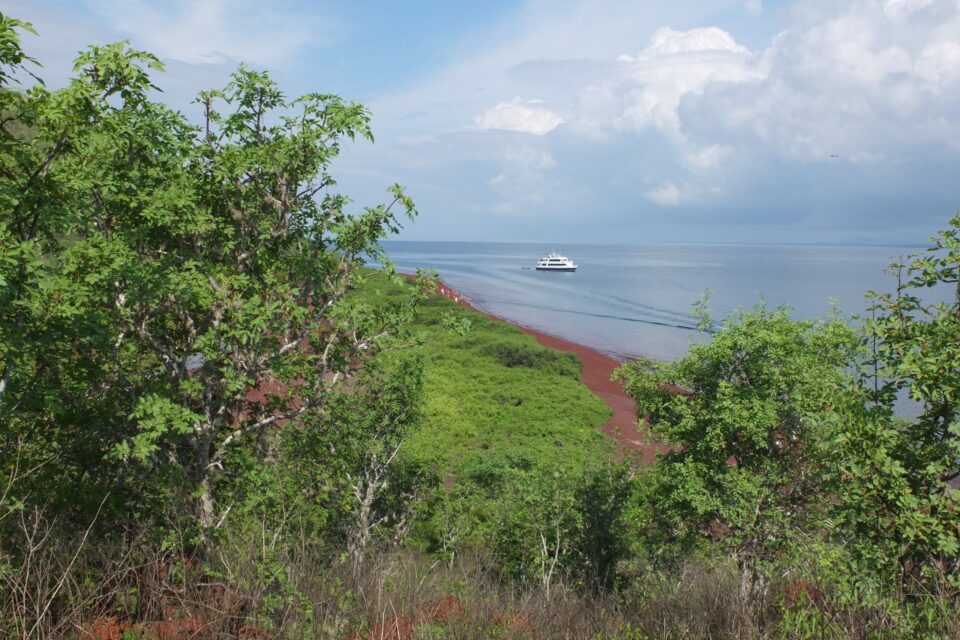
Global relevance: Financing conservation post COVID-19
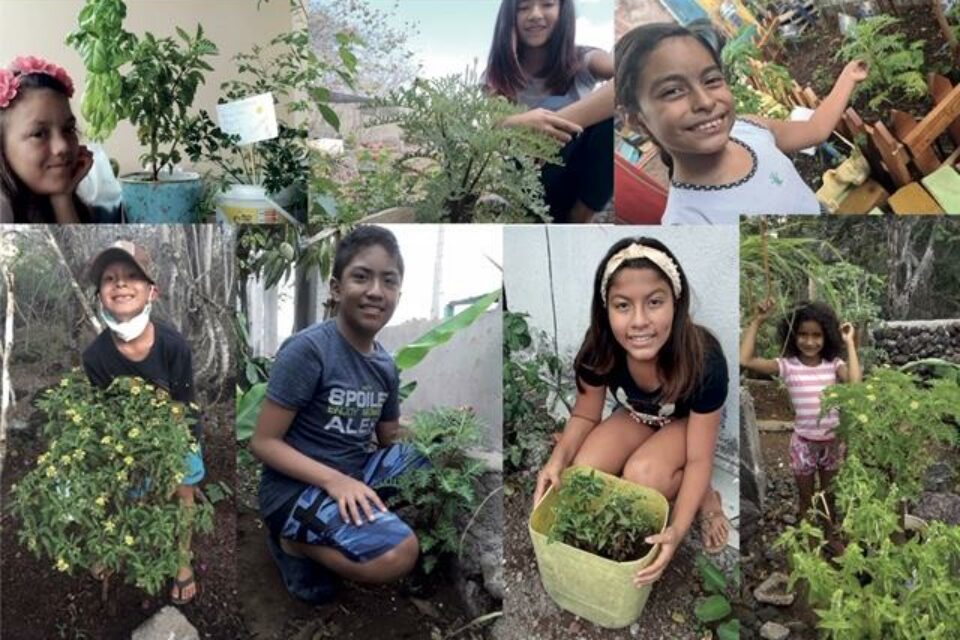
Urban Family Gardening: Positivity amidst the pandemic
